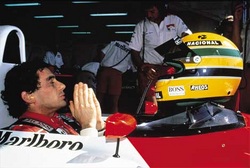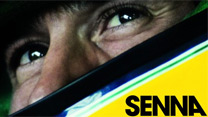“Senna” opened in Japan two months ago but British fans will have to wait until June to see the film on big screen.
Luckily I had the chance to attend a private screening of the film in London yesterday where I also spoke to the film’s author and co-executive producer Manish Pandey.
In making “Senna” the producers had access to Formula One Management’s extensive video archive. That vast amount of material has been condensed into a film which lasts little longer than a Grand Prix.
I’m sure that, like myself, many F1 Fanatic readers would have been happy to watch a Lord of the Rings-style three-part epic. But exerting discipline over what to include and what to cut has clearly been to the film’s benefit, and not just in terms of making it suitable for a mainstream audience.
“Senna” tells the story of his life and F1 career through original footage, much of it never before seen. It avoids the dry documentary style of talking head interviews, using instead voice-overs from several contributors plus clips from television commentaries.
Thanks to this approach the film moves along rapidly, introducing Senna with his breakthrough performance at Monte-Carlo in 1984 and speeding through to the onset of his rivalry with Alain Prost in 1988.
Although the film has plenty to say about Senna’s character, his charitable work and, of course, his death, his bitter battle with Prost is the film’s principle focus.
While no-one should underestimate the difficulty the producers had in choosing what to leave out of the film, the decision to skip over some events inevitably shapes the film’s view of the main figures.
Two important moments in the rising hostility between Senna and Prost are omitted. These are their wheel-to-wheel battle at Estoril in 1988 and the row that erupted over the restart at Imola in 1989.
Perhaps these weren’t thought significant enough to include, but putting them in might have helped to balance the film’s view of Senna, which verges on the saintly at times.
It is not Prost but FISA President Jean-Marie Balestre who is ultimately portrayed as the villain, and the glimpses of his heavy-handed and partisan interventions do him no favours at all.
As well as these controversial episodes there are moments of great humour, none of which I’m going to spoil by giving them away here.
For a lifelong Formula 1 fan who discovered the sport at the height of the Senna-Prost war, the film is a treasure trove of fascinating moments from a great era.
Telling a story which most people already know the end of presents problems of its own. Watching “Senna”, you know what’s coming – and you don’t want it to get there. You just want to watch the black-and-gold Lotus dancing its way around Adelaide in 1985. And you want to see more of the remarkable behind-the-scenes footage of his first home win at Brazil in 1991.
The film reaches a poignant and moving conclusion. It’s impossible to re-watch the events of that Imola weekend without feeling heavy-hearted and the final sequence strikes an emotional chord.
As Manish wrote here in October: “Many non-F1 people know Senna because of his death: hopefully, they will now have some insight into his life.”
“Senna” accomplishes that brilliantly. Quite simply it’s the greatest film about motor racing I have ever seen.
Source: www.f1fanatic.co.uk
Luckily I had the chance to attend a private screening of the film in London yesterday where I also spoke to the film’s author and co-executive producer Manish Pandey.
In making “Senna” the producers had access to Formula One Management’s extensive video archive. That vast amount of material has been condensed into a film which lasts little longer than a Grand Prix.
I’m sure that, like myself, many F1 Fanatic readers would have been happy to watch a Lord of the Rings-style three-part epic. But exerting discipline over what to include and what to cut has clearly been to the film’s benefit, and not just in terms of making it suitable for a mainstream audience.
“Senna” tells the story of his life and F1 career through original footage, much of it never before seen. It avoids the dry documentary style of talking head interviews, using instead voice-overs from several contributors plus clips from television commentaries.
Thanks to this approach the film moves along rapidly, introducing Senna with his breakthrough performance at Monte-Carlo in 1984 and speeding through to the onset of his rivalry with Alain Prost in 1988.
Although the film has plenty to say about Senna’s character, his charitable work and, of course, his death, his bitter battle with Prost is the film’s principle focus.
While no-one should underestimate the difficulty the producers had in choosing what to leave out of the film, the decision to skip over some events inevitably shapes the film’s view of the main figures.
Two important moments in the rising hostility between Senna and Prost are omitted. These are their wheel-to-wheel battle at Estoril in 1988 and the row that erupted over the restart at Imola in 1989.
Perhaps these weren’t thought significant enough to include, but putting them in might have helped to balance the film’s view of Senna, which verges on the saintly at times.
It is not Prost but FISA President Jean-Marie Balestre who is ultimately portrayed as the villain, and the glimpses of his heavy-handed and partisan interventions do him no favours at all.
As well as these controversial episodes there are moments of great humour, none of which I’m going to spoil by giving them away here.
For a lifelong Formula 1 fan who discovered the sport at the height of the Senna-Prost war, the film is a treasure trove of fascinating moments from a great era.
Telling a story which most people already know the end of presents problems of its own. Watching “Senna”, you know what’s coming – and you don’t want it to get there. You just want to watch the black-and-gold Lotus dancing its way around Adelaide in 1985. And you want to see more of the remarkable behind-the-scenes footage of his first home win at Brazil in 1991.
The film reaches a poignant and moving conclusion. It’s impossible to re-watch the events of that Imola weekend without feeling heavy-hearted and the final sequence strikes an emotional chord.
As Manish wrote here in October: “Many non-F1 people know Senna because of his death: hopefully, they will now have some insight into his life.”
“Senna” accomplishes that brilliantly. Quite simply it’s the greatest film about motor racing I have ever seen.
Source: www.f1fanatic.co.uk
“Senna” opens in the UK on June 3rd, 2011. It has already opened in some regions including Japan and Brazil.


 RSS Feed
RSS Feed